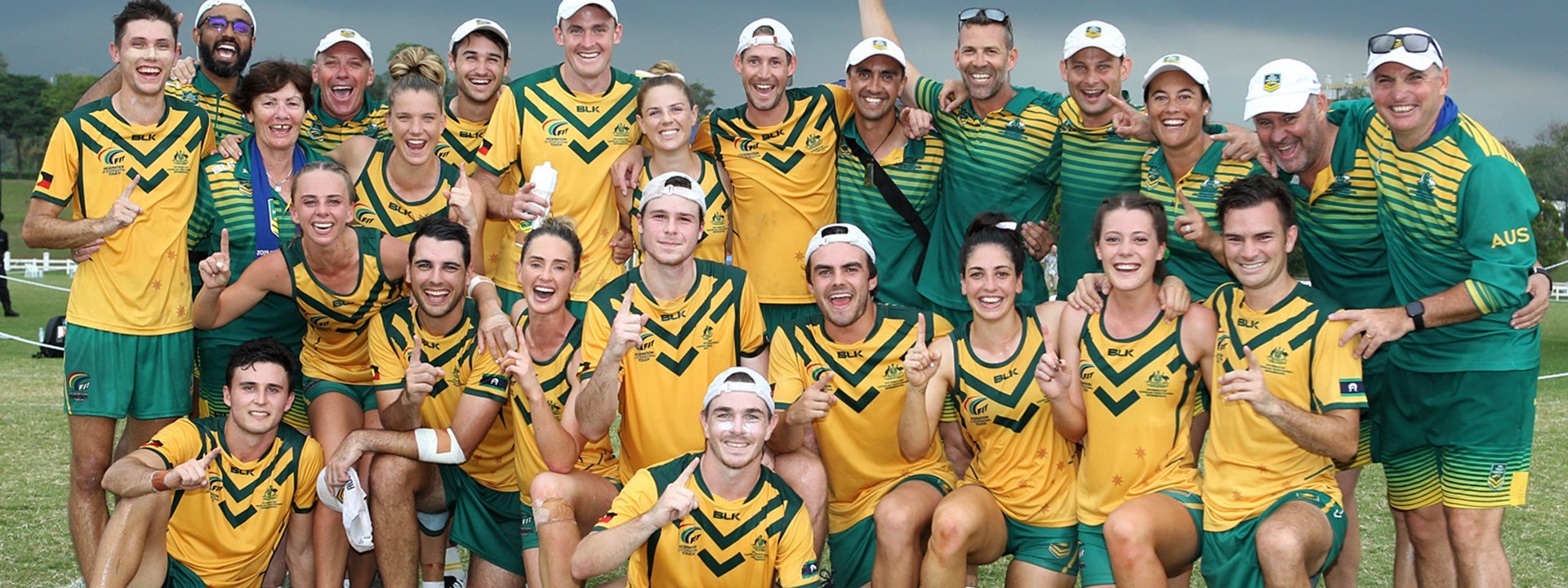
Five years ago, the Emus commenced their pursuit for Gold in a HOT and humid Kuala Lumpur, Malaysia. As preparations continue for this year’s World Cup in Nottingham, England, we take a moment to reflect on what went down at the first, and only World Cup to date to be held in Southeast Asia.
Men’s Open
Australia and New Zealand both made the final in comfortable fashion, going the round robin stage undefeated. In the most anticipated match of the tournament, the Men’s Open final was an incredible spectacle, providing an appropriate closer to the 2019 tournament. A tense first half saw limited chances for both sides, with Australia taking the lead into the break thanks to a late try by Shaun Francis.
The second half continued in similar fashion. Despite the limited scoring opportunities, the intensity was immense, with some desperate defence from both sides ensuring that the game remained in the balance. Come the 30th minute, a stellar ball from Awa Morris and incredible finish from Ruamai Erueti tied the contest. Inspired by his opposition winger, Madalitso Masache delivered a magnificent finish of his own to put Australia back in front. A quick tap and go from Reihani Finch caught the Emus off guard, once again levelling up the match. Then two consecutive tries to Jonathan Palau and Michael Law gave the green and gold their biggest lead of the match at 4-2.
However, in the 38th minute, the Kiwis scored a fortuitous try, with Shaquille Stone capitalising off a deflected pass to go over. New Zealand had one final chance to take the game to drop off but the Australian defence held strong, forcing a mistake from the Touch Blacks with the Australians taking home the gold for the 9th consecutive time.
Gold Medal Match: Australia 4 defeated New Zealand 3
Bronze Medal Match: Japan 5 defeated Papua New Guinea 2
Women’s Open
The Australian women embarked on a historic journey to reach the 2019 World Cup final against New Zealand, scoring 128 tries during the Preliminary Rounds. The 122-point differential the highest in Women’s Open's history. Six Aussies reached double figures at the tournament, but no one came close to Marikki Watego who crossed the line 36 times. This (alongside Gavin Shuker’s effort in 2011) remains the record for most tries scored at a single World Cup.
With the Gold Medal match about to commence, the Trans-Tasman rivals encountered markedly different conditions to those endured earlier in the week. As the rain and lightning continued to come down, the two sides traded points early on. Three successive tries to the Emus ensured they headed into the break with a 5-2 lead. The commencement of the second half was delayed by almost an hour due to the thunderstorm. Following a change of fields, action got back underway in what was a nervy extended break. The Aussies held New Zealand scoreless in the second half, scoring five unanswered tries to run out victors ten tries to two.
Gold Medal Match: Australia 10 defeated New Zealand 2
Bronze Medal Match: Japan 10 defeated Singapore 5
Mixed Open
Old foes Australia and New Zealand found themselves on a collision course once more in the Mixed Open, reaching the final with ease. Over half of the Emus team reached double figures on the try scorers list. Zara Nicholas topped the list, with 29 tries to her name.
Both teams looked sharp on attack in the opening five minutes with the speed of the game noticeably high. Simon Lang crossed the line first to give Australia the early advantage. New Zealand responded with tries from Mark Hodson and Tiaan Mcintyre to head into the 1st water break* with a 2-1 lead. The fierce Trans-Tasman rivals continued to trade points in the second quarter. A rare New Zealand mistake was capitalised on by Daniel Stone to put Corey Russell over for his second, as Australia headed into the halftime break, up four tries to three.
It was more of the same in the second half with neither side able to stamp their foot on the game. Heading into the final quarter, scores were tied at six tries apiece, and tension was at an all-time high. Quick feet from Simon Lang put Paige Parker over for the decisive try of the game. Although failing to convert their chances on attack, Australia maintained the intensity in the final five minutes of the contest to keep strong field possession and limit the Kiwis’ opportunities close to the line, holding on to score a one-try victory.
Gold Medal Match: Australia 7 defeated New Zealand 6
Bronze Medal Match: Scotland 12 defeated Samoa 4
Women’s 27s
For the first time since 1991, the Women’s 27s (formerly 30s) gold medal went to New Zealand, as the Kiwis ousted Australia in a tense Grand Final. Heading into the final, the New Zealand women held the mental advantage, defeating Australia eight tries to five in their round robin clash.
An early double to Melissa-Jane Buchanan provided New Zealand the lead, with Australia able to respond through tries to Jenna Rowsell and Jessica Howe. Elesha Te Paa caught the Emus offside to go over in the 16th minute, giving her side the advantage heading into the break. New Zealand proved difficult to break down at the start of the second interval, with a huge touch from Kahureremoa Aki a key moment in the game. Two tries in quick succession from Sophie Broadhead and Leah Percy gave Australia the lead for the first time in the final. However, New Zealand responded perfectly with two tries of their own to regain the lead. This led to an extremely intense final few minutes of the game. A late penalty gave Australia one last chance to equalise but ultimately, New Zealand’s defence held on in a heart-stopping content.
Gold Medal Match: New Zealand 5 defeated Australia 4
Bronze Medal Match: England 4 defeated Singapore 2
Senior Mixed
Australia was flawless in the round robin stage of the Senior Mixed division, reaching the Gold Medal match undefeated. Australia’s victory over England was overshadowed by a huge upset in the other Semi Final clash, with the Cook Islands defeating New Zealand five tries to three. The stage was set for a historic Grand Final with the Cook Islands competing in their first ever World Cup Gold Medal match in any division.
The Emus encountered some challenges in the opening quarter (heat policy in play), as uncharacteristic errors crept into their play. Regardless the Aussies remained in front two tries to one. The second quarter saw Australia work themselves into the contest, keeping the Cook Islands scoreless. In sweltering conditions, the Aussies took control of the game with a 4-1 lead. Crowd favourites, the Cook Islands managed to cross the line two more times in the second half to loud applause, but ultimately, Australia proved too skilful winning six tries to three.
Gold Medal Match: Australia 6 defeated Cook Islands 3
Bronze Medal Match: New Zealand 9 defeated England 3
Men’s 30s
For the first time ever in the Men’s 30s division, South Africa qualified for the Gold Medal match, upsetting England in an epic semi final. Star player, Adnaan Oesman came up big in extra time, scoring the match winner in drop-off. The Australians made it to the final undefeated, defeating France 19-2 in their Semi Final.
Despite a valiant effort from the Touchboks, Australia ultimately came out on top, retaining the gold medal in the division. Beau Montgomery had a memorable Grand Final performance, scoring 6 tries. The performance marked the culmination of a momentous campaign for the Men’s 30s side, extending their undefeated streak to an impressive 45 games—a record dating back to 2003.
Gold Medal Match: Australia 19 defeated South Africa 4
Bronze Medal Match: France 8 defeated England 7
Men’s 35s
Australia and New Zealand were the clear standouts in the Men’s 35s division, with their exciting round robin clash providing a teaser of what was to come in the Grand Final. In that match, Australia was victorious 8 tries to 6.
The Gold Medal match was a thrilling contest from the tap off with Australia scoring in the very first set. Dave Zanette putting over Ryan Pollock in the corner for a perfect start to a Grand Final. It was an almost flawless half of touch footy from the Emus as they headed into the break with a 4-1 advantage. Remaining behind, plays of individual brilliance from New Zealand kept them in the contest. In a decisive moment of the game, Dave Zanette made an unbelievable touch on Luke Chapman, running the length of the field to make the clutch dive, one many onlookers have described as one of the most inspirational moments witnessed on a touch field. This play would prove instrumental come the full-time siren, as Australia emerged narrow victors 6 tries to 5.
Gold Medal Match: Australia 6 defeated New Zealand 5
Bronze Medal Match: Cook Islands 8 defeated England 6
Women’s 35s
The Women’s 35s division made its debut in Malaysia, with four teams participating; Australia, New Zealand, England and Europe. The Aussies were assertive throughout the round robin stage, only conceding four tries in their six group matches. Having already prevailed twice during the preliminary round, the Emus held a clear edge over New Zealand heading into the final.
From the very first set, Australia’s class was apparent. Serena Albert went past the defence at the first time of asking as the Emus set the tone of the game early on. The Kiwis had no answers to Australia’s attack, with our girls running away to a comfortable 8-0 win. Dominique Barlow and Anna Gleeson led the way for Australia, as the Emus were crowned inaugural world champions in the Women’s 35s division.
Gold Medal Match: Australia 8 defeated New Zealand 0
Bronze Medal Match: England 6 defeated Europe 0
Men’s 40s
Australia and New Zealand dominated their pools respectively before facing off in the Gold Medal match. Scoring a combined total of 201 tries, a meeting in the Gold Medal game was inevitable.
The Kiwis had an almost flawless first half, leading five tries to one, with Australia having to wait until the 19th minute to secure their first of the game. New Zealand started the second half in similar fashion, adding another two tries to take the scoreline to 7-1. When it looked as though all hope was lost, the never say die Australian spirit came through, with tries to Dean Taylor, Gavin Shuker, and Robert Vella reducing the margin to two points come three-quarter time.
Dean Taylor's third try brought the Aussies within striking distance of New Zealand, narrowing the gap to just one with six minutes remaining on the clock. The Aussies had their chances, but New Zealand’s defence held strong. With 20 seconds to go, Australia had one final opportunity to score, but the Kiwis held on again.
Gold Medal Match: New Zealand 8 defeated Australia 6
Bronze Medal Match: Japan 6 defeated France 5
Men’s 45s
For the first time ever, a Men’s 45s division was contested at a Touch World Cup, with six teams vying for the unique honour of being crowned inaugural world champions. Australia qualified for the final after defeating Wales 10-2, whilst New Zealand held South Africa scoreless in a 6-nil victory.
Touch Blacks legend Peter Walters was the standout early in the game, opening the scoring and setting up their second. Australia responded through tries to Steele Tallon and Alan Woods but come halftime, it was New Zealand up 4-2.
Australia responded well through Matt Barclay and Alan Woods to level up the game at four all. As tensions escalated, Matt Barclay came up with the big play, stepping around his opposing middle, to go over to score. In the 38th minute the siren went off, leading to premature celebrations from the Aussies. Following initial confusion, it was confirmed that the game's finish had been delayed due to an impending thunderstorm. Following a 20-minute wait in the sheds, the two sides came back out to conclude the game.
With the last play of the game, Paul Thomasson of New Zealand made an epic break from dummy half to get pass the Aussie defence. However, the New Zealander had failed to pass the ball from dummy half upon scoring, meaning the Aussies secured the win in one of the most dramatic endings of the tournament.
Gold Medal Match: Australia 5 defeated New Zealand 4
Bronze Medal Match: South Africa 9 defeated Wales 5
Men’s 50s
2019 marked the second contested Men’s 50s World Cup tournament, with Australia taking home gold in the inaugural edition of the division in 2015. Heading into the Gold Medal match, the Australians were riding a wave of momentum, having navigated the round-robin stage undefeated, conceding points only to their Trans-Tasman rivals, New Zealand.
The Australians ran out to an early lead in the final, courtesy of a brilliant ball from David Kafoa to put Amir Ayoub in. New Zealand responded strongly in the second quarter to see scores locked up 4 apiece come halftime. In what proved to be the most crucial quarter of the game, New Zealand came out on fire, scoring three unanswered tries to take a 7-4 lead. Despite a valiant fight from the Aussies, it was the Kiwis who ultimately emerged victorious, running away winners 9 tries to 5.
Gold Medal Match: New Zealand 9 defeated Australia 5
Bronze Medal Match: Singapore 4 defeated Ireland 3
Overall Result
In extreme heat and difficult conditions, Australia retained World Champions status in both the Opens and Masters divisions, resulting in the retention of the overall World Champion status.
How will the Emus fare this year in England? Only time will tell.
The 2024 FIT Touch World Cup begins July 15th in Nottingham, England. Follow Touch Football Australia’s socials for all updates as they become available.
*Several Gold Medal Matches were played in quarter intervals due to the heat




















